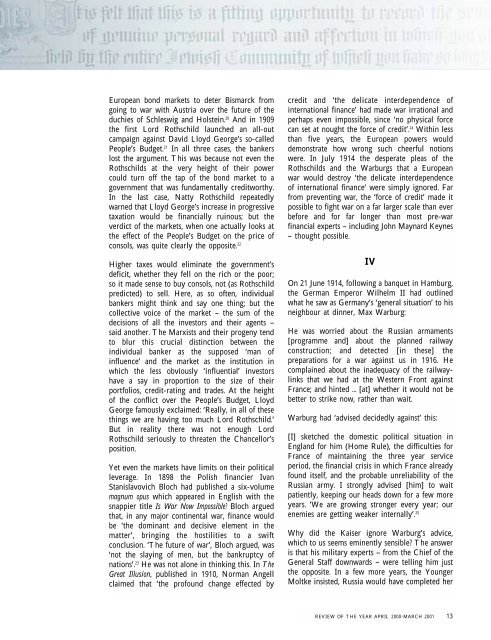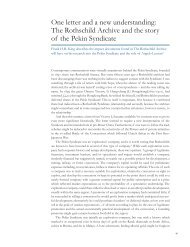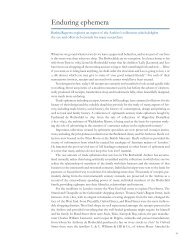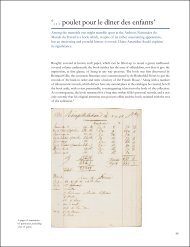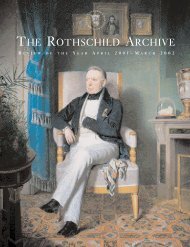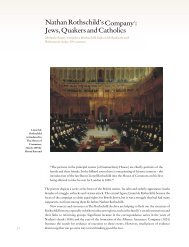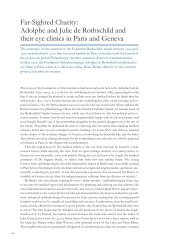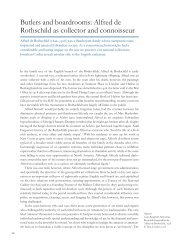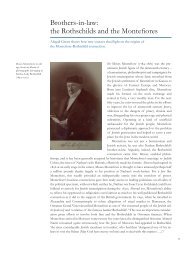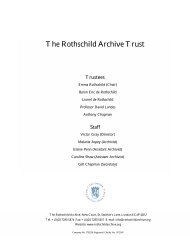Review of the year April 2000 â March 2001 - The Rothschild Archive.
Review of the year April 2000 â March 2001 - The Rothschild Archive.
Review of the year April 2000 â March 2001 - The Rothschild Archive.
You also want an ePaper? Increase the reach of your titles
YUMPU automatically turns print PDFs into web optimized ePapers that Google loves.
European bond markets to deter Bismarck from<br />
going to war with Austria over <strong>the</strong> future <strong>of</strong> <strong>the</strong><br />
duchies <strong>of</strong> Schleswig and Holstein. 20 And in 1909<br />
<strong>the</strong> first Lord <strong>Rothschild</strong> launched an all-out<br />
campaign against David Lloyd George’s so-called<br />
People’s Budget. 21 In all three cases, <strong>the</strong> bankers<br />
lost <strong>the</strong> argument. This was because not even <strong>the</strong><br />
<strong>Rothschild</strong>s at <strong>the</strong> very height <strong>of</strong> <strong>the</strong>ir power<br />
could turn <strong>of</strong>f <strong>the</strong> tap <strong>of</strong> <strong>the</strong> bond market to a<br />
government that was fundamentally creditworthy.<br />
In <strong>the</strong> last case, Natty <strong>Rothschild</strong> repeatedly<br />
warned that Lloyd George’s increase in progressive<br />
taxation would be financially ruinous; but <strong>the</strong><br />
verdict <strong>of</strong> <strong>the</strong> markets, when one actually looks at<br />
<strong>the</strong> effect <strong>of</strong> <strong>the</strong> People’s Budget on <strong>the</strong> price <strong>of</strong><br />
consols, was quite clearly <strong>the</strong> opposite. 22<br />
Higher taxes would eliminate <strong>the</strong> government’s<br />
deficit, whe<strong>the</strong>r <strong>the</strong>y fell on <strong>the</strong> rich or <strong>the</strong> poor;<br />
so it made sense to buy consols, not (as <strong>Rothschild</strong><br />
predicted) to sell. Here, as so <strong>of</strong>ten, individual<br />
bankers might think and say one thing; but <strong>the</strong><br />
collective voice <strong>of</strong> <strong>the</strong> market – <strong>the</strong> sum <strong>of</strong> <strong>the</strong><br />
decisions <strong>of</strong> all <strong>the</strong> investors and <strong>the</strong>ir agents –<br />
said ano<strong>the</strong>r. <strong>The</strong> Marxists and <strong>the</strong>ir progeny tend<br />
to blur this crucial distinction between <strong>the</strong><br />
individual banker as <strong>the</strong> supposed ‘man <strong>of</strong><br />
influence’ and <strong>the</strong> market as <strong>the</strong> institution in<br />
which <strong>the</strong> less obviously ‘influential’ investors<br />
have a say in proportion to <strong>the</strong> size <strong>of</strong> <strong>the</strong>ir<br />
portfolios, credit-rating and trades. At <strong>the</strong> height<br />
<strong>of</strong> <strong>the</strong> conflict over <strong>the</strong> People’s Budget, Lloyd<br />
George famously exclaimed: ‘Really, in all <strong>of</strong> <strong>the</strong>se<br />
things we are having too much Lord <strong>Rothschild</strong>.’<br />
But in reality <strong>the</strong>re was not enough Lord<br />
<strong>Rothschild</strong> seriously to threaten <strong>the</strong> Chancellor’s<br />
position.<br />
Yet even <strong>the</strong> markets have limits on <strong>the</strong>ir political<br />
leverage. In 1898 <strong>the</strong> Polish financier Ivan<br />
Stanislavovich Bloch had published a six-volume<br />
magnum opus which appeared in English with <strong>the</strong><br />
snappier title Is War Now Impossible? Bloch argued<br />
that, in any major continental war, finance would<br />
be ‘<strong>the</strong> dominant and decisive element in <strong>the</strong><br />
matter’, bringing <strong>the</strong> hostilities to a swift<br />
conclusion. ‘<strong>The</strong> future <strong>of</strong> war’, Bloch argued, was<br />
‘not <strong>the</strong> slaying <strong>of</strong> men, but <strong>the</strong> bankruptcy <strong>of</strong><br />
nations’. 23 He was not alone in thinking this. In <strong>The</strong><br />
Great Illusion, published in 1910, Norman Angell<br />
claimed that ‘<strong>the</strong> pr<strong>of</strong>ound change effected by<br />
credit and ‘<strong>the</strong> delicate interdependence <strong>of</strong><br />
international finance’ had made war irrational and<br />
perhaps even impossible, since ‘no physical force<br />
can set at nought <strong>the</strong> force <strong>of</strong> credit’. 24 Within less<br />
than five <strong>year</strong>s, <strong>the</strong> European powers would<br />
demonstrate how wrong such cheerful notions<br />
were. In July 1914 <strong>the</strong> desperate pleas <strong>of</strong> <strong>the</strong><br />
<strong>Rothschild</strong>s and <strong>the</strong> Warburgs that a European<br />
war would destroy ‘<strong>the</strong> delicate interdependence<br />
<strong>of</strong> international finance’ were simply ignored. Far<br />
from preventing war, <strong>the</strong> ‘force <strong>of</strong> credit’ made it<br />
possible to fight war on a far larger scale than ever<br />
before and for far longer than most pre-war<br />
financial experts – including John Maynard Keynes<br />
– thought possible.<br />
IV<br />
On 21 June 1914, following a banquet in Hamburg,<br />
<strong>the</strong> German Emperor Wilhelm II had outlined<br />
what he saw as Germany’s ‘general situation’ to his<br />
neighbour at dinner, Max Warburg:<br />
He was worried about <strong>the</strong> Russian armaments<br />
[programme and] about <strong>the</strong> planned railway<br />
construction; and detected [in <strong>the</strong>se] <strong>the</strong><br />
preparations for a war against us in 1916. He<br />
complained about <strong>the</strong> inadequacy <strong>of</strong> <strong>the</strong> railwaylinks<br />
that we had at <strong>the</strong> Western Front against<br />
France; and hinted ... [at] whe<strong>the</strong>r it would not be<br />
better to strike now, ra<strong>the</strong>r than wait.<br />
Warburg had ‘advised decidedly against’ this:<br />
[I] sketched <strong>the</strong> domestic political situation in<br />
England for him (Home Rule), <strong>the</strong> difficulties for<br />
France <strong>of</strong> maintaining <strong>the</strong> three <strong>year</strong> service<br />
period, <strong>the</strong> financial crisis in which France already<br />
found itself, and <strong>the</strong> probable unreliability <strong>of</strong> <strong>the</strong><br />
Russian army. I strongly advised [him] to wait<br />
patiently, keeping our heads down for a few more<br />
<strong>year</strong>s. ‘We are growing stronger every <strong>year</strong>; our<br />
enemies are getting weaker internally’. 25<br />
Why did <strong>the</strong> Kaiser ignore Warburg’s advice,<br />
which to us seems eminently sensible? <strong>The</strong> answer<br />
is that his military experts – from <strong>the</strong> Chief <strong>of</strong> <strong>the</strong><br />
General Staff downwards – were telling him just<br />
<strong>the</strong> opposite. In a few more <strong>year</strong>s, <strong>the</strong> Younger<br />
Moltke insisted, Russia would have completed her<br />
REVIEW OF THE YEAR APRIL <strong>2000</strong>-MARCH <strong>2001</strong> 13


